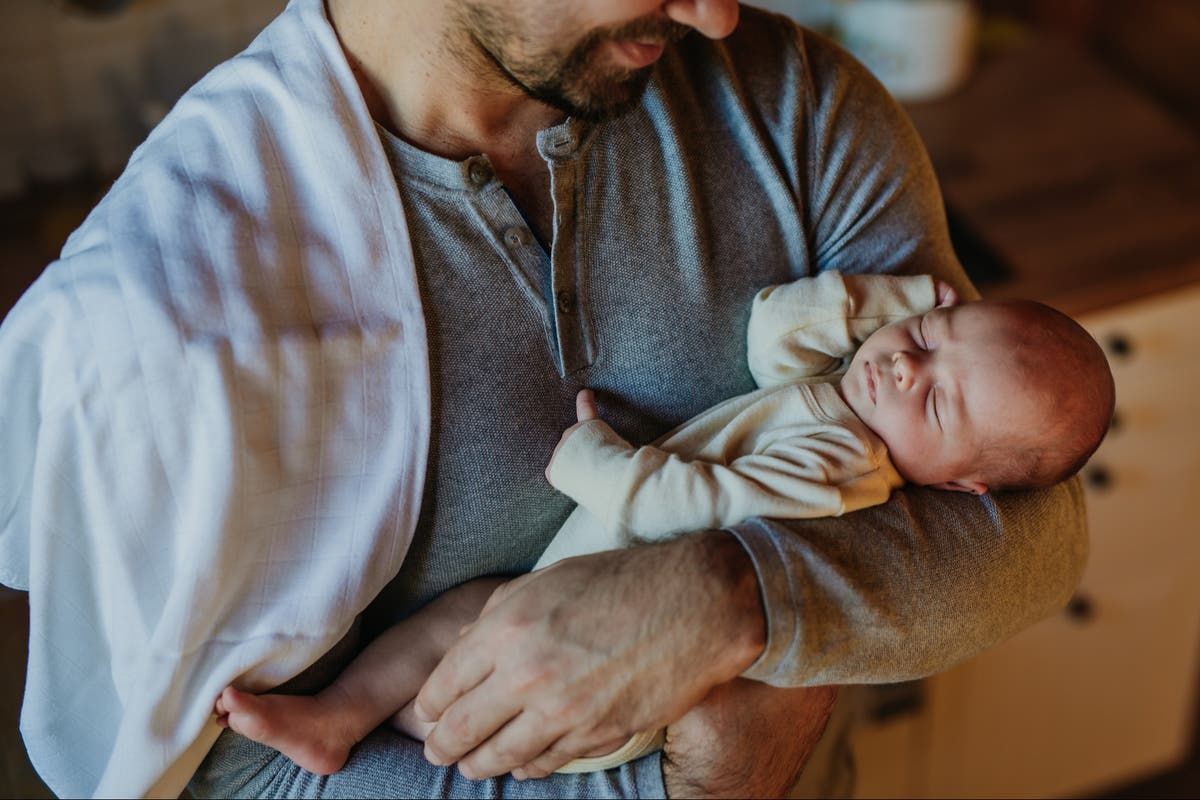W.hen Billy Beech's daughter was born in 2019, he was able to take the maximum two weeks' paternity leave from his job as a groundsman at a Premier League football club. It all happened “in an instant,” says the 33-year-old. “For two weeks she was asleep on my chest, we held each other and fed, and then that was gone before you knew it.” After that fortnight, she returned to work. “You're still worried about the baby, you're still tired, you're still thinking 'okay, I need to get home,'” she remembers. The fact that his wife was still recovering from a C-section was also an additional concern. Back at her job at the stadium, she ended up “watching [his daughter] grow through my phone” – receiving “photos [and messages] saying, 'she rolled here, she's moving, look how cute she is.' “You miss those moments.”
It's a situation many parents will recognize all too well: the confusion of the first few weeks of adjusting to life as a new parent, followed by a surprisingly quick return to the old routine. As Beech says: “Your life has changed forever… and now you're back where you left it.” For many fathers like him, the legal provision of paternity leave seems insufficient, and this is not surprising given that the UK's offer is the least generous in Europe.
This may be why childcare provision is emerging as one of the most important issues of the upcoming general election. The Labor Party has promised to create 100,000 extra childcare places to support working parents, while the Conservatives previously promised to offer 30 hours of free childcare for children aged nine months to five years from September 2025. Meanwhile, The Liberal Democrats have set their sights on a major paternity leave reform. They promised to introduce a “dad month,” giving new fathers an extra month of paid leave to “use it or lose it.” But would that really be enough to change things for ordinary families, let alone shake up a clearly inadequate system? And what is the long-term impact of the current policy on parents and their children?
Paid paternity leave was not introduced in the UK until 2003. Currently, most new fathers and same-sex couples are, like Beech, entitled to up to two weeks' leave, which they can take consecutively or in periods. of two weeks during the baby's first year. That option to split your parental entitlement is very new – it only applies to babies born or adopted after April 6, 2024. The “secondary” caregiver receives £184.03 each week or 90 per cent of their weekly salary average, either of the two options. Those figures turn out to be lower, and taxes and national insurance are still deducted from that sum. To be eligible for this, they must have been continuously employed at their current workplace for at least 26 weeks before the end of the “qualifying week” (i.e. the 15th week before their expected date of birth).
Psychotherapist Kamalyn Kaur says she has worked with men who felt “devastated by not being able to spend time with their children” after birth. “In the short term, there is guilt, stress and anxiety: they feel like they are not supporting their partners as much as they could,” she explains. “Imagine the guilt you would feel leaving your partner after those first two weeks and knowing that you really have no choice but to go back to work.”

Some companies, of course, offer a more generous package, although the charity Pregnant Then Screwed recently found that less than a third of fathers could access enhanced paternity leave pay after the birth of their most recent child. What if you are self-employed? There is currently no legal provision on paternity for self-employed workers. Beech left her old job a few years after the birth of her daughter and decided to retrain at a nanny agency. little. He and his wife now have their own childcare business, so he now falls into this category, and he notes that if they decide to have another child, the situation would be different. “There are so many financial factors to worry about.”
Many workers who are eligible are not taking their leave in full, often because they simply do not have the means to do so. Having a baby is expensive. In the midst of a cost of living crisis, it is no surprise that many families simply cannot allow their monthly income to drop so significantly. Pregnant Then Screwed found that more than 70 per cent of fathers only used part of their paternity leave entitlement because they couldn't afford to go without it any longer. In another survey jointly commissioned by the organization and published in 2023, 62 percent of fathers said they would take more leave if statutory paternity pay was increased. Uptake of shared parental leave is also very low, with only 1 percent of eligible mothers and 5 percent of fathers choosing to participate. Like paternity leave, it is poorly paid and plagued by complicated eligibility criteria.
There are other factors at play as well. When Alison Green's coaching company Work, Me and the Baby launched a study with Hult International Business School, they found that parents “had encountered generational biases in the workplace around the division of caregiving responsibilities.” of the children,” he says. “There was still an unspoken (and in some cases, spoken) expectation that women should take on the majority of caregiving, and some senior managers probably raised an eyebrow if their male employees had to miss meetings or take time off to deal with a problem. childcare issue.” Of course, when women take on this responsibility, they inevitably face the penalty of motherhood, leading to lower salaries and restricted career opportunities. With the current setup, it seems like no one wins.
So are there any countries that are actually granting paternity leave correctly? Unsurprisingly, the Scandinavian countries are good at this: the contrast between our system and the shared parental leave offered in Sweden is stark. A couple is entitled to 480 days of paid leave between them (a single parent will also receive the same amount) and for the first 390 days, they can receive 80 percent of their wages up to a monthly cap; During the remaining period, they receive a fixed stipend.
The first months are crucial to establish a strong emotional bond between parents and children.
Kamalyn Kaur, psychotherapist
The impact of the UK policy goes beyond finances: it could even set the template for a parent's relationship with their child. “The first few months are crucial to establishing a strong emotional bond between a parent and their child, because that's when much of the early attachment takes place,” Kaur says. Recent research has found that fathers' brains can change after the birth of their child (even though they do not physically go through a pregnancy) to better prepare them for parenthood. Spending quality time with your baby drives those changes. A 2023 study compared brain scans of new parents in California and Spain. Only Spanish fathers (who are entitled to 16 weeks of paternity leave at full pay and are therefore more likely to spend more time with their new babies) experienced significant changes in brain regions related to the ability to sustain attention. .
This attention is also important for babies. “Early experiences shape the developing brain and lay the foundation for positive social, emotional, and cognitive health,” says Crystal Miles, doula and infant communication expert at Connected Babies. “The more parents can interact and the earlier the interaction, the better the outcome,” she adds. What if that interaction is restricted? “In the long term, this can potentially lead to emotional detachment from the father and less involvement in the child's life as she gets older,” Kaur says. “Then the child may lean more toward the mother and whoever the other primary caregiver is.” There isn't a lot of research dedicated to the long-term impact of paternity leave (or lack thereof); Limited uptake inevitably means there are limited statistics to work with. But existing studies tend to associate longer periods of leave with better father involvement in early childhood.
Right now, the limitations of our paternity leave mean that it is almost a given that the majority of caring responsibilities will end up falling on the child's mother. In a 2022 survey, 80 percent of parents said the UK's unequal parental leave policies had reinforced traditional gender stereotypes. That can have a big impact on a relationship: in his new book Milf, singer and actress Paloma Faith suggests that the change in dynamics after the birth of her children contributed to her eventual breakup with her long-time partner. “Us [mothers] “We don’t always want to be the boss and our partners the manager,” she writes of the unspoken expectation that women take the lead in childcare. It can certainly be a sure recipe for bad feelings. “I think it's easy to fall into that cycle of resentment, bitterness, anger, fear of missing out on your career. [or] being held back,” says Kaur. Research has also repeatedly shown that more equal parental leave could help reduce the gender pay gap.
The impact of paternity leave, then, goes far beyond the first weeks of the baby's life. It could prove to be a decisive issue during the election, and whatever your politics, surely we can all agree that current politics not only harm parents, but the entire family.












